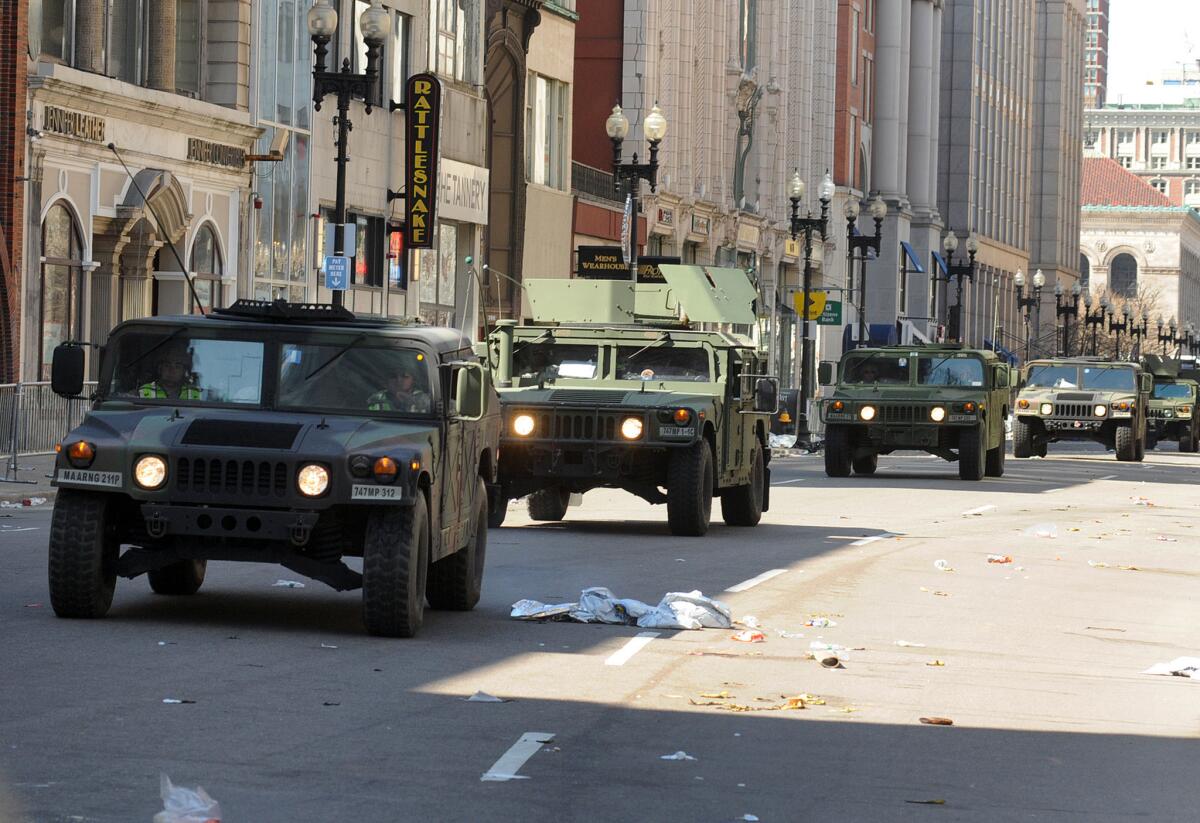McManus: We’re safer than we think

After the terrorist attacks of Sept. 11, 2001, the most frequently heard forecast was: “This changes everything.”
Americans would live in constant fear of the next attack, many pundits predicted. The desire for safety would spawn a security state that would trample constitutional freedoms. The economy would take a long-term hit. American life would never be the same.
Most of those dire predictions didn’t come true, of course. The U.S. economy rebounded quickly. Civil liberties came under stress, but fears of a surveillance state weren’t realized. Fear hasn’t ruled our lives either. Since 2007, more Americans have ranked unemployment as a bigger worry than terrorism. One reason was that it turned out terrorism, despite our fears, wasn’t really on the rise.
FULL COVERAGE: Boston Marathon attack
Terrorism wasn’t unknown in the U.S. before 2001; far from it. Anarchists and labor agitators wreaked havoc in many cities in the early 20th century. Antiwar radicals planted bombs in the U.S. Capitol in 1971. Between 1963 and 1981, one president was assassinated and two others nearly killed. From the 1960s through the 1990s, attacks were mounted by anti-Castro activists, Puerto Rican nationalists and a right-wing extremist named Timothy McVeigh, among others.
But since Sept. 11, 2001, both the number of terrorist attacks and the number of deaths from terrorism in the U.S. have declined. According to a report last year from the National Consortium for the Study of Terrorism and Responses to Terrorism, law enforcement agencies’ success rate in thwarting attempted attacks is up as well.
From the raw numbers, a few other trends are also noteworthy. Terrorist acts by Muslim Americans, once feared as a growing problem, have declined since 2009. Instead, most of the terrorist incidents in the last decade have been nonfatal attacks by two homegrown groups with specialized concerns: the Animal Liberation Front (which targets farms and laboratories where it believes animals are being mistreated) and the Earth Liberation Front (which has set fire to construction sites it sees as encroaching on wilderness areas).
PHOTOS: Explosions at Boston Marathon
As horrible as Monday’s attack in Boston was, the kind of mass terrorism that 9/11 seemed to herald — a wave of bombings in public places — simply hasn’t happened. There have been interrupted plots — in Times Square, on airplanes — but there had been abortive plots before 9/11 too.
As political scientist John Mueller of Ohio State is fond of pointing out, Americans are more likely to die by drowning in a bathtub than from a terrorist attack, even after Boston.
So the question isn’t why are we in such danger? Instead, it’s why are we so safe?
The growing counter-terrorism units of the military and intelligence community will tell you that it’s because they have spent a decade keeping Al Qaeda on the run in places such as Pakistan and Yemen, and that is surely part of the answer.
The Department of Homeland Security will tell you that it’s because the federal government has poured billions of dollars into domestic intelligence, preparedness and training, and that’s part of the answer too.
But what we know about terrorist attacks that have been thwarted during the last decade often points to lower-tech, lower-cost measures: increased vigilance by aircraft crews and passengers (the 2001 shoe bomber, the 2009 underwear bomber), increased vigilance by ordinary civilians (the 2010 Times Square bomber), and increased attention by police forces in general.
“The most important work in protecting our country since 9/11 has been accomplished with the [police] capacity that was in place when the event happened, not with any of the new capability bought since 9/11,” Michael A. Sheehan, a former counter-terrorism chief for the New York Police Department, wrote in a 2009 book. “The big wins had little to do with the new programs.”
And there’s another factor: We’ve been lucky. Most of the potential terrorists who have been caught, Mueller notes, have been “incompetent, ineffective, unintelligent, idiotic, ignorant, inadequate [and] unorganized.”
“Al Qaeda wasn’t as good as we thought they were,” Sheehan, now an assistant secretary of Defense, said this year. “[And] we are better than we often give ourselves credit for.”
Have there been mistakes? Certainly. We’ve undoubtedly spent more than necessary on homeland security, but we’ll never know which part of the spending was wasted.
Yes, there have been detentions and arrests that were unwarranted. And yes, in the most shameful chapter of the last decade, the U.S. government engaged in torture that produced little or no useful intelligence, as documented in the report of a bipartisan panel this week.
But for all that, after a decade that began in bone-cold fear, we have remained reasonably safe. The fabric of American life has been preserved. The Constitution and its guarantees are still intact.
In the wake of Monday’s tragedy, there will undoubtedly be more inspections of backpacks at stadiums and finish lines, more metal detectors and sensors. The inconveniences and indignities of air travel will continue.
But we’re safer than we think we are. For all its excesses and inefficiencies, this may be one problem big government has mostly gotten right.
Follow Doyle McManus on Twitter @DoyleMcManus
More to Read
A cure for the common opinion
Get thought-provoking perspectives with our weekly newsletter.
You may occasionally receive promotional content from the Los Angeles Times.











